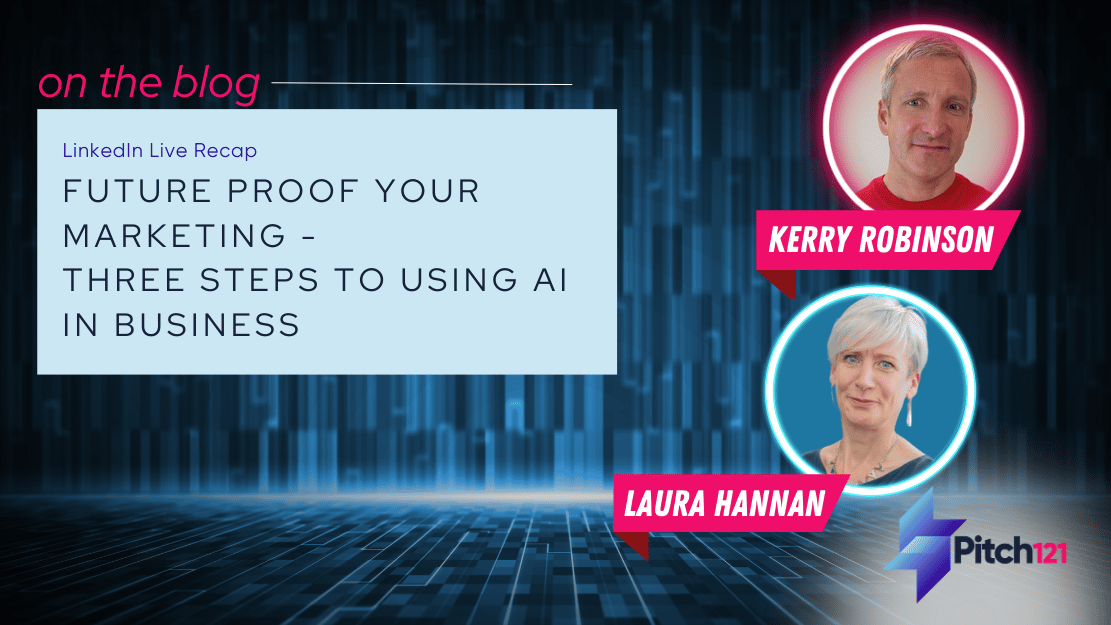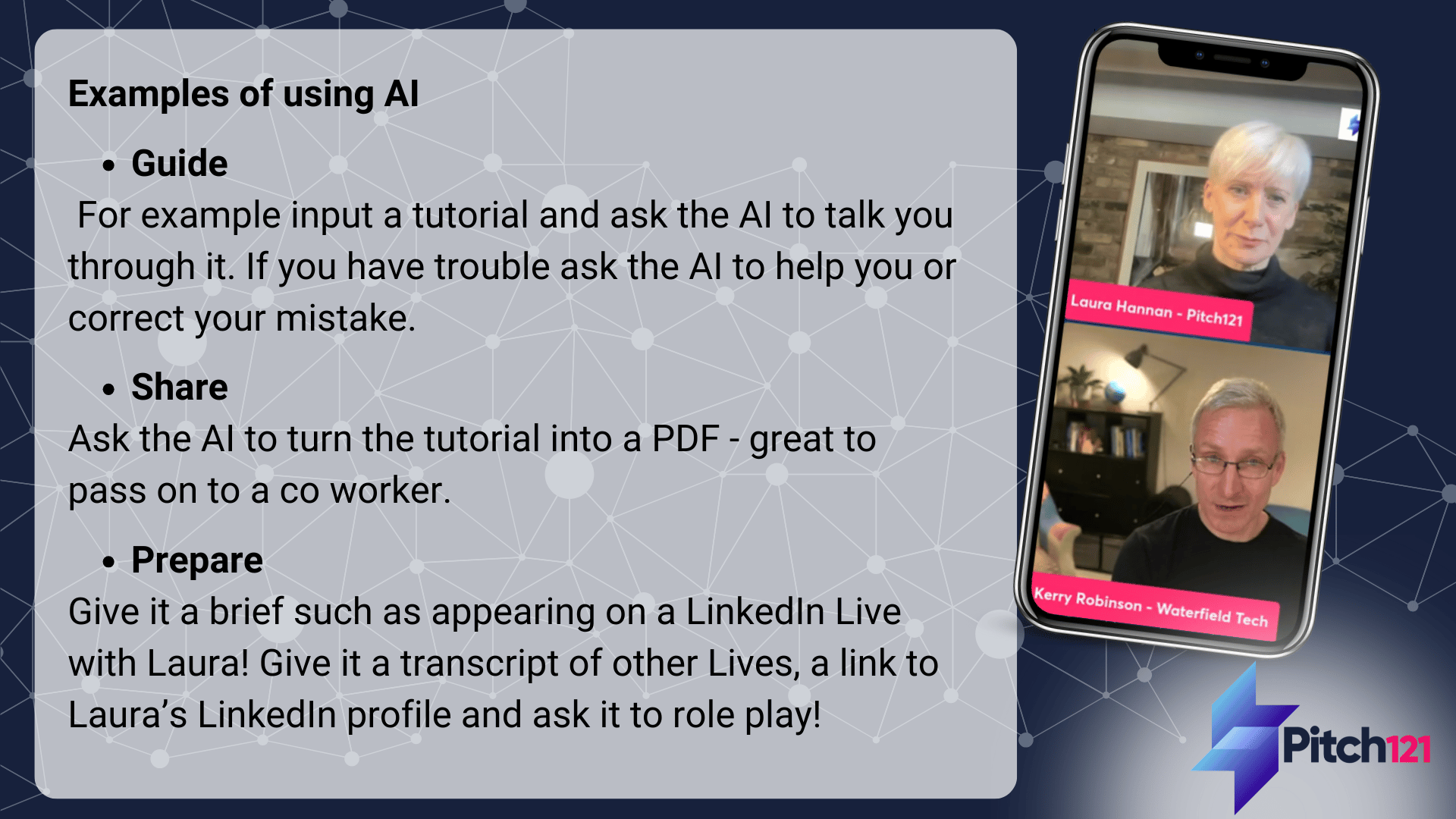

Thanks to Kerry Robinson of Waterfield Tech for an enlightening LinkedIn Live discussion about AI marketing and business. This fast-moving subject is essential for staying competitive.
Here are my takeaways from our chat—what you and your business should consider now, next, and in the not-so-distant future!
If AI isn’t already part of your daily workflow, it should be. Kerry shared some great pointers on using AI and the current roles in which it excels.
Stay close to the models
There are many different AI tools on the market, and you may well find the perfect one for your needs. However, mastering a raw AI model—OpenAI (ChatGPT), Anthropic (Claude), Google (Gemini), or Microsoft—has its own advantages.
These models are robust and easy to use, just as they are. Pick your platform of choice and learn how to use it effectively. Each is similar in ability but has its own nuances in how you interact with them. AI tools are built on these models, and it takes time to integrate new features that you will first have access to by using the raw AI model.
Use AI daily
Yes, just like your morning cuppa or your trip to the gym, make AI part of your daily routine. Install it on your phone, laptop, and desktop. Crucially, don’t rely on it for straight content creation, which is stale and obviously AI-generated. It can definitely play a role in content creation, but why not aim to use it as an intellectual partner, a source of creative ideas, or a critique of your work?
Kerry’s takeaway – If you are not using AI at least 10 times a day, you aren’t using it enough!

AI is a bright, helpful, resourceful – but imperfect – intern!
Kerry made a great analogy about AI being like an intern in your department. You can delegate tasks, and it can be a great research assistant—but don’t forget that it isn’t going to get everything right all the time. You are accountable for the quality and output of your business, so check that those facts ring true.
Data privacy
Use paid versions of AI services to opt out of having your chats used for training data. This is particularly important if you are using AI for business purposes. If you are processing sensitive data, make sure to anonymise it before inputting it into AI models.
Keep up-to-date
Staying up to date with the developments in AI can feel overwhelming, but here are a few ways to keep on top of the information juggernaut:
As you become more comfortable using AI, it’s time to explore AI agents. Here’s some great tips on how to implement these in your AI business strategy:
Build AI Agents
AI Agents perform automated tasks. Package your best practices for using AI into custom GPTs, gems (Gemini), or projects (Claude). Give them specific roles, access to relevant information, and tools to perform tasks. This will allow you to delegate tasks to AI – now you are moving into agentic AI.

Evolving Search
Start using AI to discover ideas, websites, and products. How your customers find your products and services is already changing. Personal AI assistants will eventually replace traditional search engines.
Adapt your sales and marketing strategies
AI-to-AI Communication
The evolution of search leads us to consider how AI agents can communicate with each other. In the future, AI agents will negotiate prices and terms and automate many aspects of sales and customer service.
Discussing the future for AI and business with Kerry was enlightening. His experience gives him some meaningful insight into what is just around the corner for all of us.
He told me the future of AI goes beyond using AI tools and involves building businesses designed around AI from the ground up. Here’s what to envision.
AI First Business
Imagine a business where AI delivers end-to-end value creation, with humans in supervisory roles. This means that many tasks and processes will be automated, with humans ensuring that the AI is doing the right thing.
Scale with AI
Building businesses with AI at their core allows them to scale quickly, with better performance and lower costs. As AI develops, these improvements will only increase.
Impact on the Economy
As AI-first businesses become the norm, the cost of delivering products and services will reach zero. This will change the world significantly and challenge how we see ourselves as humans and how we value our work.
It is inspiring and exciting to see how AI will impact marketing and business. We are just at the beginning of the AI revolution, and it will be essential to continue to learn and adapt.
By integrating AI into our daily workflow, experimenting with AI agents, and building businesses with AI at the core, we will all be well-positioned to take advantage of AI’s exciting new possibilities.
I can’t wait for my next catch-up with Kerry- he always leaves me feeling amazed and inspired!
While AI can generate content, it can sound generic. You can use AI to refine your writing, ensuring your content engages and aligns with your brand’s voice. To stand out in a noisy environment, focus on thought leadership and original research, as these will likely be more important than ever. Also, consider that AI tools can now search for information and bring relevant ideas and concepts to you.